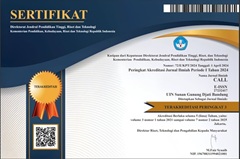INDUSTRIALITATION EFFECTS IN GEORGE ORWELL’S THE ROAD TO WIGAN PIER (1937)
DOI:
https://doi.org/10.15575/call.v3i1.12602Abstract
To see industrialization effects in England, this research focused on a literary work of an essay. The book can describe and express what happened in the reality. This research focuses on the book to know Industrialization effects on George Orwell The Road to Wigan Pier. The Road to Wigan Pier written in 1937 tells the experience, notes, and ideas from George Orwell when he walked down the slums area in England. In order to reveal the ideology within the book, this research uses qualitative research to interpret the data. The data were collected through purposive sampling, namely focusing on the data that concerns the industrialization encountered in the elements of the book. As a result, George Orwell divided his work into two parts. The first part content about George Orwell notes when he walked down the slums area in England. He describes slums condition, the lodging that he occupies, the state of miners condition, poverty, and unemployment. In the second part content about George Orwell idea and his critic of industrialization effects and the failure of socialism and his perspective on socialism, his opinion about socialism that the real socialist is people who actively want to see tyranny is destroyed and not only imagine that matters only to want.
Â
Keywords: Industrialization; Industrialization effects; socialism
References
Abrams, M. H. 1981. A Glossary of Literary Terms. New York: Holt, Rinehart
Allen, Robert C. 2006 . Explaining The British Industrial Revolution, and Winston
Atkins, Jhon. 1971. George ORWELL. London: Calder and Boyars.
Booker, M. Keith. 1996. A Practical Introduction to Literary Theory and Criticism. USA: Longman.
Callinicus, Alex. 2004. The Revolutionary Ideas of Karl Marx. London: Bookmars
Eagleton, Terry. 1976. Marxism and Literary Criticism. London: Methuen & Co. Ltd.
Eagleton, Terry. 2002. Marxisme dan Kritik Sastra. Yogyakarta : Sumbu, (Indonesian Translation by Roza Mulianti dkk)
Faruk. 1999. Pengantar Sosiologi Sastra: dari Strukturalisme Genetik sampai Postmodernisme. Yogyakarta: Pustaka Pelajar.
Goldmann, Lucien. 1975. The Genetic-Structuralis Method in The History of Literature. “towards Sociology of the Novelâ€. New York.: Tavistock Publications Limited.
Orwell, George, 2016. The Road to Wigan Pier, Bekasi: Metabook Pelajar.
Shelden, Michael. 2010. The World of George Orwell. Recorded Books, LLC.
Downloads
Published
Issue
Section
Citation Check
License
Authors who publish in CALL agree to the following terms:
- Authors retain copyright and grant the journal right of first publication with the work simultaneously licensed under Attribution-ShareAlike 4.0 International (CC BY-SA 4.0) License that allows others to share the work with an acknowledgment of the work's authorship and initial publication in this journal.
- Authors are able to enter into separate, additional contractual arrangements for the non-exclusive distribution of the journal's published version of the work (e.g., post it to an institutional repository or publish it in a book), with an acknowledgment of its initial publication in this journal.
- Authors are permitted and encouraged to post their work online (e.g., in institutional repositories or on their website) prior to and during the submission process, as it can lead to productive exchanges, as well as earlier and greater citation of published work (See The Effect of Open Access).




